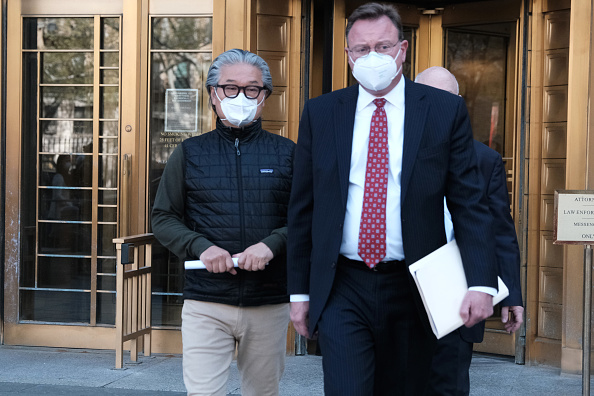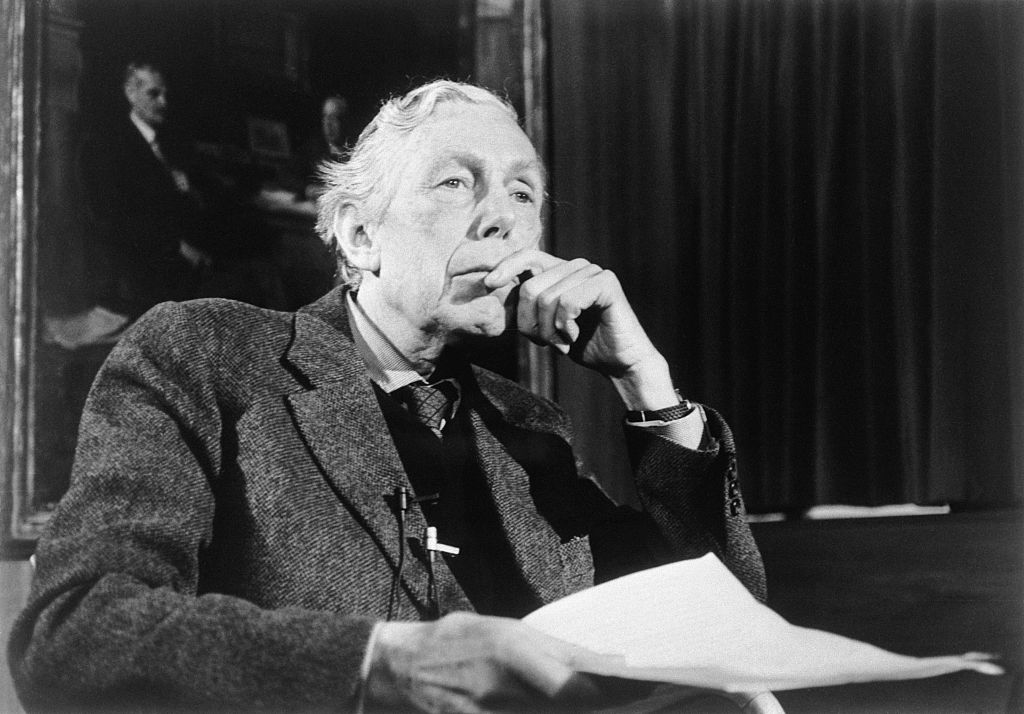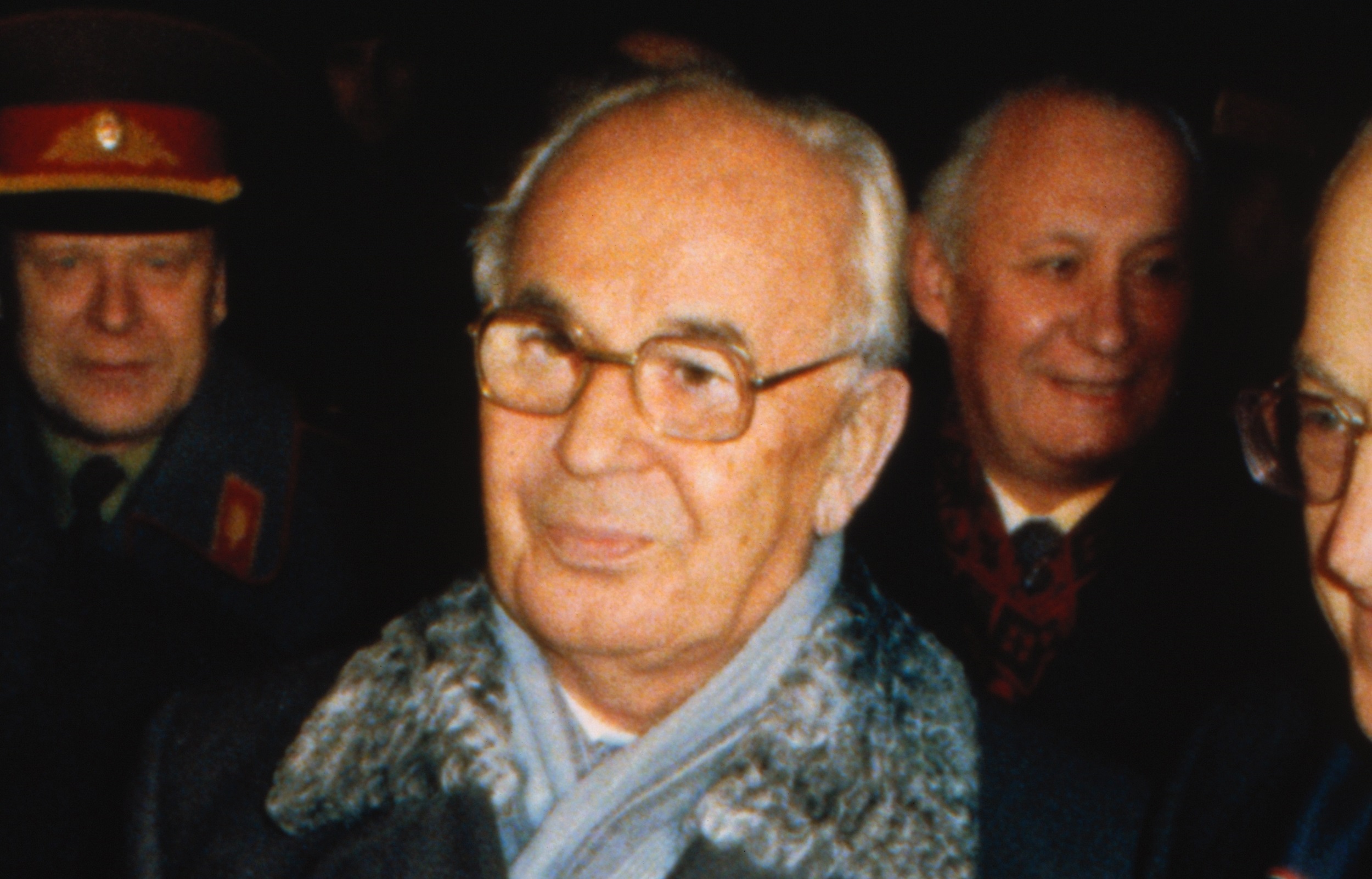We owe one of the most insightful observations about human reasoning to F. Scott Fitzgerald. In a 1936 essay, The Crack-Up, he wrote, “the test of a first-rate intelligence is the ability to hold two opposed ideas in the mind at the same time, and still retain the ability to function.”
By that measure, the Western debate on the Ukraine war is packed with geniuses. From the beginning we have been treated to mistaken assumptions wrapped in logical fallacies, inside contradictions. The net result is that in the third year of war Russia is on the offensive, well-supplied and well-armed, with no end in sight.
So, let us consider some of the key areas of fractured logic at play with respect to this conflict – the Seven Deadly Contradictions of the war.
1 The Threat contradiction: Russia is weak – but also a great threat to NATO
Well before the Ukraine war, the West saw Russia as a weak “spoiler” or troublemaker, rather than as a serious challenge. Even after the illegal annexation of Crimea, John McCain called Russia a “gas station masquerading as a country.” To Barack Obama it was no more than a “regional power.”
Since the 2022 invasion, Russian performance in the field has likewise been roundly mocked by most Western analysts. The Russians, it is said, are only making minimal gains at great cost in men and equipment.
Astoundingly, the official narrative – and the actual belief within many Western defence establishments – is that the Ukraine war is somehow weakening Russia military at the cost of only a fraction of the US defence budget.
Yet at the same time General Cavoli, NATO’s top commander, explicitly admitted last month that Russia’s army has grown 15 per cent since the invasion and that it is reconstituting “far faster” than initially expected.
Moreover, the Russians are “failing” so badly, we are told, that they can’t even defeat a significantly smaller, backward country like Ukraine. The truth is more uncomfortable, though.
The Russian war machine has arguably destroyed Ukraine’s own fighting capacity two or three times over by now and would have likely brought Kyiv to heel months ago, perhaps even by the end of 2022. The only reason why Ukraine still stands is because of the extraordinary volume of Western financial and military aid which now dwarfs even the Marshall Plan – not because of Ukrainian bravery alone, however impressive and commendable that might be.
The idea of a weak Russia coexists in the Western mind with the completely contradictory fear of a future Russian attack on NATO. Indeed, Macron is urging European intervention into the conflict otherwise some NATO country “will be next.”
The same people who talk up Ukraine’s military prowess in the current war, on the basis that Russia is “failing” militarily in the grand scheme of things, are often those who take it as a given that “Putin won’t stop there.”
These are the “experts” who explain how Crimea can be retaken, and who maintain that Russia can be “defeated” in Ukraine, but then turn around and warn that the Baltics are at high risk of invasion.
Is Russia strong or weak? These contradictory notions cannot all be true at the same time, but they are being used as a basis for justifying the current Allied policy on Ukraine.
2 The Putin contradiction: Putin is a bungling tyrant about to lose control – yet Russians back him and the war
Views and expectations about Putin and his regime weigh heavily in the Ukraine debate. The Western elites’ bias towards the Whig theory of history, couched in their sense of self-righteousness, leads to miscalculation where Putin is concerned. The assumption that Putin is vulnerable and that the Russian people would not support his “special military operation” – remember the myth about the supposed power of “Russian mothers” to scare even the Kremlin – played an important role in the general Western decision to get heavily invested in this proxy war against Russia.
This assumption has never disappeared, despite all evidence to the contrary. Every time there is a political event in Russia, whether Prigozhin’s lunatic adventure last year (over-generously termed “coup attempt”) or the recent removal of Shoigu from the Ministry of Defence, the Western chorus rises right on cue to sound the death knell of Putin’s reign.
Yet that happy conclusion never arrives, because, fundamentally, Putin remains genuinely popular in Russia and the people back his policies.
It is true that this can change, especially if Putin’s policies begin to fail. But so far he has been very successful, both domestically and internationally. Especially in the geopolitical realm, Putin has (unfortunately) brought Russia back as a key player in global affairs.
The debate on whether Putin is a good strategist or not is as old as at least the Georgian war of 2008. The evidence shows that he has achieved his goals at every step, including in Crimea in 2014, in Syria and in Africa.
In the Ukraine invasion the Russian president has likewise proven a dangerous foe. He took sensible decisions to retreat from Kyiv and Kherson in 2022, and Russia’s results in the field have, by and large, improved since then.
There are some, like Britain’s former defence secretary Ben Wallace, who still argue that Putin has “already lost” the war in a strategic sense, because it has led to a strengthening of NATO. Alas, now Russia has the upper hand in this conflict and it has confounded all expectations both militarily and economically.
3 The Isolation contradiction: Russia is isolated – but sanctions don’t work
The idea that Russia is an international pariah excluded from civilised company and subject to the strongest sanctions in history is reassuring to Western officialdom and elite commentariat. But none of this is true.
In fact, much of the Global South has maintained at best an ambiguous or neutral stance towards Russia in the context of the Ukraine war. It is the same Global South that Western powers are now scrambling to woo back to their side, as they realise how important these formerly “Third World” countries are becoming as the world’s economic centre of gravity shifts eastwards.
Yet it is the likes of China and Russia, with their alternative structures like the BRICS (Brazil, Russia, India, China, South Africa, Iran, Egypt, Ethiopia, and the United Arab Emirates) or through hybrid interventions, such as Moscow’s mercenaries in Africa, which are increasingly locking-in strategic positions in the Global South.
Additionally, India wants Russia’s oil and Iran is already tied in strongly with Putin’s regime. The Western position on the Ukraine war does gather more votes at the UN, but Russia’s supporters (explicit or tacitly), though fewer in number, usually represent a larger share of the world’s population.
Finally, the utter failure (so far) of Western sanctions tells its own story about Russian “isolation.” Alas, there is no such thing: not only is Russia continuing to receive “banned” items from Chinese and even European suppliers (operating through places like Kyrgyzstan), but even Ukraine itself keeps cashing in gas transit fees from Moscow as before the war.
4 The Legal contradiction: Putin’s rule-breaking cannot stand – yet we should break the rules to ‘defeat’ him”
Evidently, Putin is a serial breaker of international law, with the 2022 Ukraine invasion being only the most catastrophic and dangerous of these actions.
Of course, the Russians cynically argue that the West’s record is not exactly unblemished in this regard, either. They always refer to such instances as the legally dubious bombing of Serbia, the Iraq invasion and the Libyan campaign of 2011. The difference might be one of degree (however large) rather than substance in terms of the letter of the law, but certainly the moral difference in terms of the law’s “spirit” is substantial – or so the Western argument would go.
In the case of Ukraine, the Western position is almost entirely constructed on moral arguments that centre on the defence of Ukrainian liberty and democracy against Russian imperialist aggression. We are told that a prime reason for backing Ukraine is to uphold the principle of a rules-based order and to demonstrate that bullies and rule-breakers will not “get away” with aggression and other international law crimes. In other words, this is a moral fight first and foremost: good versus evil.
This is of course a fine and useful framing, but it is also fragile. It carries a great risk of compromising that all-important moral compass – and discrediting the West’s righteous image– if in the pursuit of “justice” we adopt some of the methods and principles of those we oppose.
There have been moral instances of this from the very start of the war, especially with the extreme, blanket Russophobia that gripped Western societies from February 2022. It even led to absurd situations like banning Russian classical music composers from concert programmes.
A more serious situation, with high-level political implications, involves the arbitrary freezing of Russian foreign exchange assets in Western banks in the early days of the invasion.
This was unprecedented in scale, between parties that were not in a state of war. There is now even a strong push to confiscate these Russian funds altogether, which represents a special level of geopolitical inanity.
This entire business has also contributed to a new international trend among some Global South countries to shift part of their foreign exchange reserves to non-Western currencies, precisely because of this clear-cut Western grab of Russian property, whether “morally” justified or not.
At its extreme, this mode of policy making based on virtue-signalling leads to such non-sensical proposals as “ejecting” Russia from the United Nations, which by definition would collapse the notion of the UN and its global remit.
Finally, as it has been observed numerous times, there is also an awkward – though perhaps unavoidable – dose of hypocrisy at the heart of the liberal-values-promoting West’s support for a Ukrainian regime that not only tolerates but indeed incorporates openly neo-Nazi elements.
At home, in the EU or the US, the “far right” in the form of anything beyond mushy, open-borders centrism is seen as a threat to democracy, but abroad, SS-themed nationalist militias are celebrated as heroic pillars of freedom – which indeed, in Ukraine’s case they are. But the double standard applied in both cases, on questions that are nominally subject to “moral” arguments, is counter-productive.
5 The Strategy contradiction: No peace until all lost ground is retaken – but then Russia will continue fighting anyway
It hardly bears pointing out that neither the West nor Ukraine have any actual strategy for bringing the war to a conclusion, let alone a successful one. This fact has been openly acknowledged multiple times at official levels and in the public conversation.
Indeed ,the lack of a strategy was and is one of the main arguments deployed by the increasingly large opinion faction that is sceptical about continued aid to Ukraine.
There is much talk about how Putin must be “defeated” and about how Ukraine must fight to achieve “victory.” But no one has explained what “victory” means in a war against a state like Russia that possesses nuclear weapons.
The entire conversation around the war resembles a kind of kabuki theatre where peace has become a completely abstract notion based on pre-conditions which everyone knows are not realistic (e.g. full restoration of Ukrainian territorial integrity including Crimea), but which they pretend to believe in anyway.
One consequence for the prospects of peace is the vicious circle of NATO membership for Ukraine. Ukraine is promised NATO membership when the war ends, but Russia won’t end the war precisely because Ukraine will then become a NATO member. Even if by some miracle Kyiv retakes all lost territories, it still cannot force Russia to make peace, while Russia can still conduct long-range strikes against Ukraine across the border.
6 The Escalation contradiction: Putin is reckless – yet it is safe to send European troops to Ukraine
There is a growing chorus of European voices, initially spurred by Emmanuel Macron, which are making the case for sending NATO regular troops to Ukraine, ostensibly to perform non-combat roles far from the front line.
It has been explained in these pages several times why this idea is an absolute folly, risking not only the political unity of the Alliance but, more seriously, a full escalation to direct war with Russia.
There is little doubt that, if such a deployment does take place, the Russian armed forces will engage these prospective European formations. Not only have Russian officials openly vowed to do this, but it would also make political and military sense to try to remove from the very start any such foreign intervention in the theatre of operations.
But none of these risks are acknowledged by the European advocates of this adventure. For some reason they essentially believe Putin “wouldn’t dare”, presumably out of a concern to avoid a war with NATO. Yet this perspective coexists with the longstanding Western view of Putin as a reckless leader, capable of crazy decisions such as…invading Ukraine. No one ever explains exactly how these two opposing notions can possibly go together.
7 The Moral contradiction: Aid to Ukraine risks war with Russia – but we shouldn’t tell Kyiv what to do
Finally, the most serious fallacy with regard to Western involvement in the war regards the moral hazard created by giving Ukraine a completely blank check in its conduct of the war despite the increasing potential of this dragging NATO itself into the conflict.
The West does not owe Ukraine anything, as Ukrainians themselves would admit. Yet, quite rightly, Western countries have decided to support Kyiv’s fight against this barbaric invasion.
Things have evolved, however. What was initially “assistance” has become a “lifeline.” Now Ukraine is entirely dependent on what it gets from its Western sponsors. The war is not only a drain on Western resources but also a humanitarian catastrophe. Critically, it is bringing NATO and Russia ever closer, by degrees, to a direct confrontation.
The mantra parroted by all Western officialdom is that only the Ukrainians get to decide how and when to move towards peace negotiations. But at the same time, we are told this is not only Ukraine’s war, but our war, collectively, which is why we need to pay to supply the Ukrainian military.
This is contradictory enough, but the ultimate decision over the policy that puts NATO citizens at risk and consumes their collective wealth has been outsourced to a foreign government, that of Ukraine. Exactly how this squares with any sense of democratic accountability on the part of our elected officials is not clear, and in fact it doesn’t.
What, then?
These are just some of the most prominent fallacies, myths, illusions, and contradictory aspects of the Ukraine war debate. Quite a few others could be listed as well, from the misguided linkage of Ukraine to the China-Taiwan situation, to US policy, or to the odd NATO policy and deterrence emphasis on the Baltic when Russian aggression has been exclusively concentrated in the Black Sea region.
As the war enters an acute phase with Russia’s offensive on Kharkiv and Ukraine’s mobilisation experiencing continued problems and delays, the need to take a clear-eyed view of the situation becomes critically important. The stakes have risen greatly, there should be no room left for miscalculation and bias.
A good start in this regard would be to eliminate these seven deadly contradictions from our debates.
Russia is not weak, but increasingly strong as it mobilises and turns the war into an economic growth engine not unlike what the US did in the Second World War. This however does not mean that Moscow is somehow “destined” to attack NATO if it overcomes Ukraine.
As for Putin, his track record shows that according to his and his people’s criteria, he is a competent leader and strategist, all things considered. Russia is also not the isolated caricature on the world stage, of Western imagination, quite the opposite. It has plenty of friends in the Global South, and, crucially, it enjoys a commonality of interests with China. In short, Russia should not be underestimated.
Moving to the war itself, it is right to support Ukraine’s fight with weapons and financial resources. But there have to be limits because, fundamentally, the case for backing Ukraine rests or should rest on Western interests not on Ukrainian wishes.
It is in the interests of the Euro-Atlantic powers that Ukraine’s defences should hold long enough — and at a low enough risk of escalation — to give us time to rearm and restore an overwhelming NATO advantage and deterrence along the Alliance’s entire eastern flank for the years to come.
Only from that kind of position of strength can the West ever negotiate a durable settlement of European security affairs with Russia. Anything less is not even worth trying.
___________________________
Gabriel Elefteriu is deputy director at the Council on Geostrategy in London and a fellow at Yorktown Institute in Washington, D.C.






If Russia takes Ukraine, there will be 30 years of insurgency